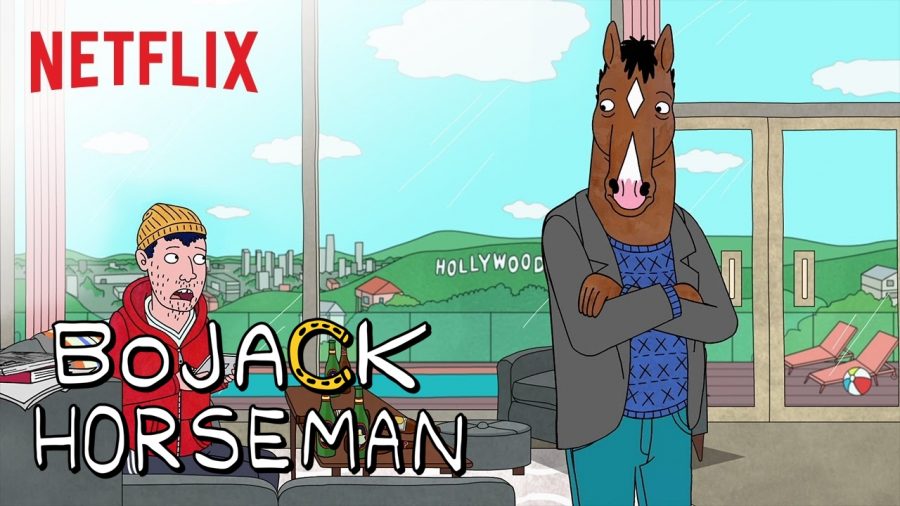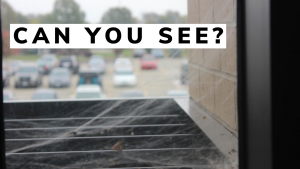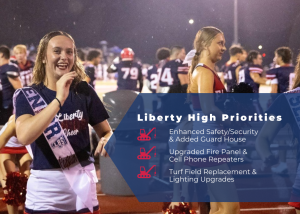Nice While It Lasted
A review of the provocative and progressive Bojack Horseman
Bojack and Todd’s relationship, while verbally abuse, remains one of the closest knit ones in the show.
February 19, 2020
(Spoilers Ahead)
In 2014, Netflix introduced the world to Bojack Horseman – an anthropomorphic alcoholic horse, weighed down by his own self-loathing – and on Jan. 31, he said his final goodbyes. This tragicomedy surrounding Bojack and his quirky cast of friends brings nuance to the adult animation genre, making what seems like a childish show with talking animals a brilliant tearjerker filled with beyond PG jokes.
We began the show watching Bojack (Will Arnett) struggle to write a memoir, before hiring ghostwriter Diane Nguyen (Alison Brie) to do it for him. We also meet Bojack’s agent Princess Carolyn (Amy Sedaris), his couch-crashing roommate Todd (Aaron Paul), and Diane’s loveable boyfriend and fellow 90s TV star Mr. Peanutbutter (Paul F. Tompkins). The series starts very surface level, with the characters fitting into cookie-cutter tropes: Bojack is a broken alcoholic, Diane is a sarcastic and witty author, Princess Carolyn is organized and frazzled, Todd is quirky and crazy and Mr. Peanutbutter is an overly positive person/dog. Throughout the first few episodes, we see them getting into whacky mishaps, including Bojack claiming to hate the troops after insulting Navy Seal Neal McBeal.
Then, we see Bojack’s darker side when he sabotages Todd’s rock opera because he’s so deeply terrified of being alone. It only goes deeper from there, and all the while Bojack is abusing every substance on the planet, doing genuinely awful things, yet we as an audience continue to forgive him. The season ends with Bojack’s career being revived, yet all of his relationships are shattered.
The next four seasons, in summary, follow these characters through extreme growth. In season two Bojack is set to star in the movie “Secretariat” as the titular character, finds love in recently awakened coma victim named Wanda (Lisa Kudrow), attends the funeral of his former best friend Herb, before getting director Kelsey Jannings (Maria Bamford) fired from his movie. It’s downhill from there, when Bojack decides to visit a former friend before almost having relations with her 17-year-old daughter. Princess Carolyn dates “Vincent Adultman” (Alison Brie), who in reality is three kids stacked on top of one another in a trench coat, Diane fights for the #MeToo movement before ending up on Bojack’s couch, Mr. Peanutbutter creates a new game show with an absurdly long title, and Todd does “Todd things”, like spending excessive amounts of money on useless products.
Season three focuses on Bojack’s Oscar campaign, and the bender Bojack goes on after not winning, while season four dives more into the mental state of our characters, and introduces us to Bojack’s secret sister Hollyhock (Aparna Nancherla). Season five somehow makes a dark series darker, with Bojack starring in a detective drama titled “Philbert” before almost choking his co-star and ex-girlfriend Gina (Stephanie Beatriz) to death. Then, the light at the end of the tunnel, season six is all about recovery.
The ending of Bojack is all about accountability – Bojack isn’t a good person, he’s done awful things, and the show refuses to let him get off clean. Even after months in rehab and leaving Hollywood (known in the series as Hollywood) to go teach acting at Wesleyan University. He becomes genuinely better, but that doesn’t change the mental damage he’s forced on dozens of people. He spends time in jail after being revealed to have caused the death of Sarah Lynn, Diane ends their friendship on a very somber note, Princess Carolyn refuses to represent him as a client, and his acting career is essentially over. This accountability is such a refreshing change, many shoes that feature quote on quote broken men like “Mad Men,” or “Breaking Bad,” allow their protagonists to have heroic endings. Who cares about the women that Don Draper abused or the people killed by Walter White, they’re allowed to be heroes because they were humanized in some way, shape or form. Bojack certainly humanizes its characters and we empathize with them despite their wrongs, but they are never let off the hook. They are imperfect people (or animals) that are forced to develop and grow and take responsibility for their actions.
The show also does an incredible job representing minority groups and portraying darker topics. Sexual assault and the #MeToo movement, particularly the pardoning of victims, are showcased in “Hank After Dark” (S2E7). We see Hollywood forgive a rampant abuser because he’s a celebrity, something that is certainly true to the real world. Alcoholism and recovery are covered throughout the entire series, mostly during Bojack’s time at rehab during season six, and emphasizes that recovery is possible. One of the show’s main characters, Diane, gets an abortion in “Brrap Brrap Pew Pew,” (S3E6) and the episode focuses on the backlash she receives. In regards to mental illness, we see both Bojack and Diane struggle with depression at various points. Bojack’s is most heavily focused on in “Stupid Piece of S**t,” (S4E6) where we see his mind’s inner workings and the intrusive self-loathing floats that float around in his head. Diane’s depression is a major plot point towards the end of season six, as we see her begin taking antidepressants, and struggle with writing her memoir. Even Bojack’s mother Beatrice (Wendie Malick), who is portrayed as a very cold and unsympathetic character is shown to have inner depths in “Time’s Arrow,” (S4E11) where we see her struggle with PTSD, an abusive father and husband, and a lobotomized mother. Bojack consistently brings accurate depictions of these taboo topics, rooting the show in reality and making it more relatable to viewers.
Bojack Horseman covers so much more than comedy; it’s a perfect blend of laughter and anguish. It eliminates every boundary, yet does so in a way that doesn’t feel disturbing. We see relatable characters on screen, both good and bad people, and we root for them to change. This show has been so incredibly important, bringing awareness to topics many shows are afraid to cover. Throughout its prolific six-year run, Bojack has changed the world of TV, and offered a true, honest story for the world to watch. It’s hard to see it end, though as the properly titled series finale said, it was “Nice While It Lasted.”














